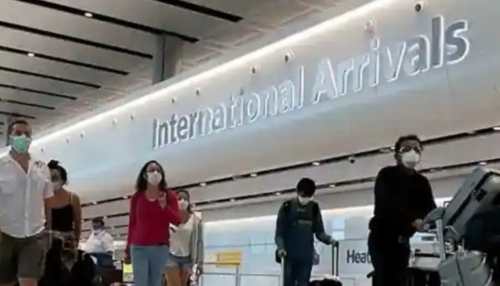- News>
- India
India revises guidelines for international arrivals - check rules, complete list of `at-risk` countries

The updated list of nations from where travellers would need to follow additional measures on arrival, including post-arrival testing (countries at-risk) are countries in Europe including The United Kingdom, South Africa, Brazil, China among others
Highlights
- The guidelines released on Friday come into force from January 11
- For "not at risk" countries, a sub-section shall undergo post-arrival testing at random at the airport
- Children under 5 are exempted from both pre- and post-arrival testing
New Delhi: India on Friday (January 7) made seven-day home quarantine mandatory for all international arrivals and an RT-PCR test on the eighth day, as it issued revised guidelines for international passengers. The guidelines released on Friday come into force from January 11 and will remain effective till further government orders.
The updated list of nations from where travellers would need to follow additional measures on arrival, including post-arrival testing (countries at-risk) are countries in Europe including The United Kingdom, South Africa, Brazil, Botswana, China, Ghana, Mauritius, New Zealand, Zimbabwe, Tanzania, Hong Kong, Israel, Congo, Ethiopia, Kazakhstan, Kenya, Nigeria, Tunisia and Zambia.
For "not at risk" countries, a sub-section (2 per cent of the total flight passengers) shall undergo post-arrival testing at random at the airport.
As per the existing rules, which have been retained in the revised guidelines, travellers coming from countries specified as "at risk" have to submit sample for Covid testing post-arrival and they required to wait for the results at the airport before leaving or taking a connecting flight.
If tested negative, they need to undergo home quarantine for seven days and then get their RT-PCR test done on the eighth.
They are also required to upload the results of the RT-PCR test conducted on the 8th day on the Air Suvidha portal (to be monitored by the respective States/UTs). If negative, they have to further self-monitor their health for next seven days.
These 2 per cent travellers in each flight will be identified by the airline concerned (preferably from different countries), according to the revised guidelines. Laboratories shall prioritise testing of samples from such travellers.
Travelers from all categories of countries (including those 2 per cent who were selected for random testing on arrival and were found negative) will undergo home quarantine for seven days and undertake an RT-PCR test on the 8th day, officials said, sharing details about revised guidelines said.
International travellers arriving through seaports/land ports will also have to undergo the same protocols as above, except that facility for online registration is not available for such passengers currently.
Contacts of the suspect cases are the co-passengers seated in the same row, three rows in front and three rows behind along with the identified cabin crew, the guidelines said. Also, all the community contacts of the travelers who have tested positive (during home quarantine period) would be subjected to quarantine for 14 days and tested as per the Indian Council of Medical Research protocol, the guidelines stated.
Children under 5 are exempted from both pre- and post-arrival testing. However, if found symptomatic for COVID-19 on arrival or during the home quarantine period, they shall undergo testing and treated, according to the laid down protocol.
Prior to undertaking the journey, all travelers will have to upload a negative RT-PCR report of the test conducted within 72 hours of the beginning of the journey. Each passenger shall also submit a declaration with respect to the authenticity of the report and will be liable for criminal prosecution, if found otherwise, according to the guidelines.
